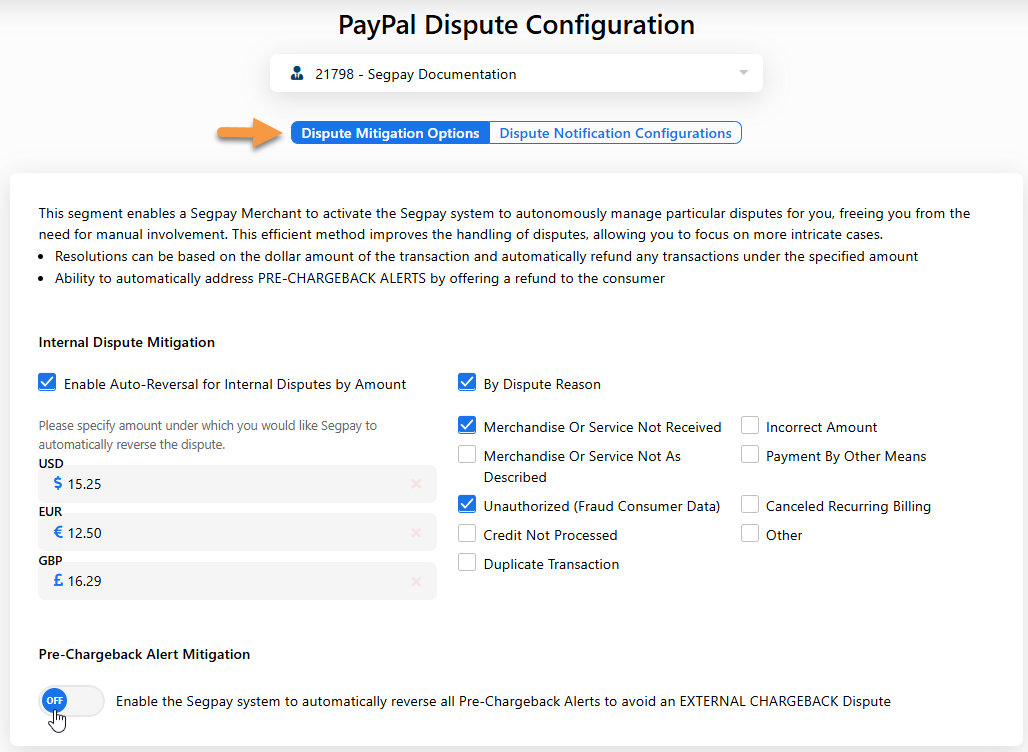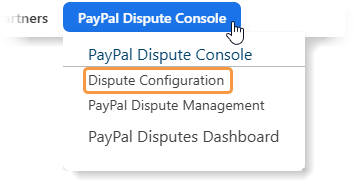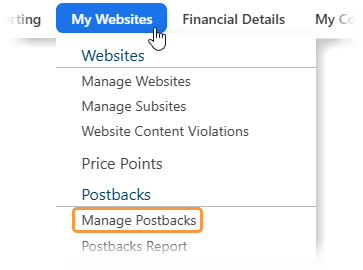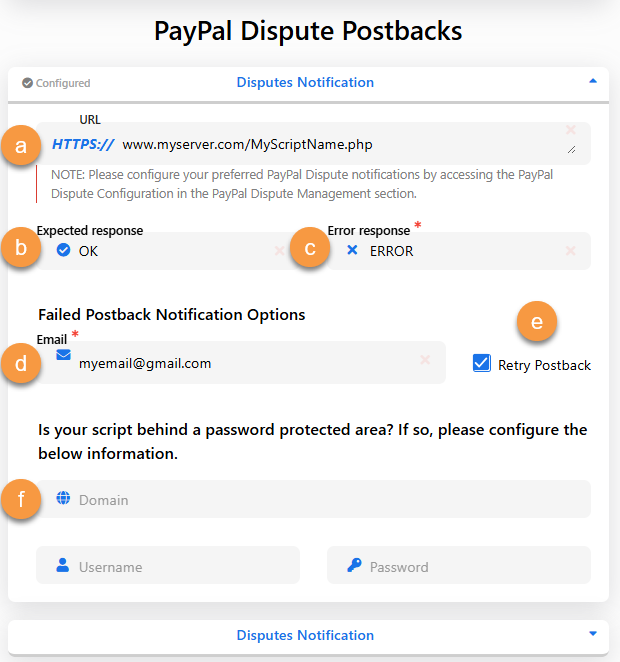PayPal Dispute Configuration
PayPal Dispute Configuration lets you control how you receive notifications about PayPal disputes. Notifications can be delivered via email, postbacks, or both, and can be triggered by specific events—such as when a dispute is created, updated, requires a response, or is resolved. This automation helps you stay informed and respond efficiently, reducing the risk of missed deadlines or unresolved cases.
Dispute Mitigation Options
The Dispute Mitigation Options tab allows you to automate customer refunds based on predefined criteria. This feature helps you resolve disputes faster, with less manual effort—reducing workload and improving response time.

You can configure automatic reversals based on:
-
Transaction amount – For example, automatically refund all disputes under a specific dollar threshold, such as $25.
-
Dispute reason – Automatically refund disputes that match selected reasons (e.g., duplicate transaction, item not received).
-
Pre-chargeback alerts – Enable automatic refunds in response to early warnings received when a customer contacts their card issuer about a potential dispute before a formal chargeback is filed.
Enabling automatic reversals can help prevent formal chargebacks and protect your merchant account from penalties.
Dispute Notification Configuration
The Dispute Notification Configuration tab allows you to choose which PayPal dispute events trigger alerts—such as when a dispute is created, updated, requires a response, or is resolved. You can also specify how to receive these notifications: by email, postbacks, or both.
Configuring Notification Settings
To set up your PayPal Dispute Notification preferences:
-
Log into the Segpay Merchant Portal: https://mp.segpay.com/
-
Navigate to PayPal Dispute Console > Dispute Configuration.

-
Select the appropriate Account, then click Dispute Notification Configurations.

-
Choose the dispute statuses you want to be alerted about (see Dispute Notification Statuses).

-
Select your notification delivery method: Email, Postbacks, or Both (see Dispute Notification Delivery Methods ).

-
Notification via Email: Enter one or more email addresses separated by a comma.
-
Notification via Postbacks: To use this feature, you must create a PayPal Dispute Postback in the Merchant Portal by navigating to My Websites > Manage Postbacks.
-
-
Click Save.
Dispute Notification Statuses
You can receive alerts for the following dispute events:
| Dispute Status | Definition |
|---|---|
| Dispute Created | Triggered when a customer files a PayPal dispute for reasons like unauthorized charges or non-delivery. |
| Dispute Updated | Indicates new information has been added to a dispute. Often requires a follow-up or review. |
| Dispute Needs a Response | Merchant action is required within a time window (typically 3–30 days). Failure to respond may result in loss. |
| Dispute Resolved | The case has been closed and a final decision has been made. |
Dispute Notification Delivery Methods
You can choose how to receive dispute notifications—either by email, postback, or both, depending on your business needs.
Email Notifications
If you selected "Notification via Email," you will receive an email for each dispute status you selected. Each message includes the following information:
-
Subject Line: Reflects the dispute status (e.g., "DISPUTE UPDATED")
-
Email Contents:Case Number, Internal Dispute ID, Created On, PayPal Invoice Number, Transaction ID, Account Type, Dispute Reason, Current Status, Amount, Dispute Stage, Dispute Channel, Response Due Date
Postback Notifications
If you selected "Notification via Postbacks," you'll receive a postback for each dispute status you selected.
Example PayPal Dispute Notification Postback:
https://mywebsite.com/PostbackApi/api/PostbackTest/Get?disputecreatedate=12%2F11%2F2024+2%3A53%3A47+PM+(GMT+STANDARD+TIME)&disputeupdatedate=12%2F11%2F2024+2%3A56%3A14+PM+(GMT+STANDARD+TIME)&disputeduedate=12%2F31%2F2024+2%3A53%3A47+PM&disputeid=PP-R-MKF-10104689&disputestage=Inquiry&disputechannel=Internal¤tstatus=WaitingForSellerResponse&disputereason=MerchandiseOrServiceNotAsDescribed&billaddr=&billcity=&billcntry=US&billemail=paul-buyer%40segpay.com&billname=test+buyer&billnamefirst=test&billnamelast=buyer&billphone=&billstate=&transguid=d158f058-a24d-4d6a-bb1a-b2190117eaca&tranid=151559956&transtime=10%2F30%2F2024+4%3A59%3A15+PM+(GMT+STANDARD+TIME)&transamount=1.07&action=DisputeNeedsResponse&method=Get&purchaseid=89758966&urlid=27078&postbackconfiguniqueid=40082&processingtime=12%2F18%2F2024+6%3A30%3A10+PM+(GMT+STANDARD+TIME)&uri=https%3A%2F%2Fe2.toccata.com%2FPostbackApi%2Fapi%2FPostbackTest%2FGet&merchantid=12345
Configuring PayPal Dispute Postbacks
To receive PayPal dispute notifications via postbacks, you'll need to also configure PayPal Dispute postbacks. You can set up two different postbacks if you need to send notifications to separate systems. Once configured, assign the postback to the appropriate package.
To create and assign a PayPal Dispute postback, follow these steps:
-
Navigate to My Websites > Manage Postbacks

-
Add a new postback or Edit an exiting one.
-
Scroll to the “PayPal Dispute Postbacks” section on this page.
-
Click one of the "Dispute Notification" options to reveal the postback configuration screen.

-
Configure the postback by filling in the required information:

-
URL: Enter the endpoint where Segpay will send the postback.
Example: www.myserver.com/MyScriptName.php -
Expected Response: Enter text that indicates a successful postback such as “GOOD” or “OK.”
-
Error Response: Enter text that indicates a failed postback such as “BAD” or “ERROR.”
-
Failed Postback Notification Options: Enter an email address to receive notifications for failed postbacks. This is required if “Retry Postback” is enabled.
-
Retry Postback: Check this box to initiate a reattempt to deliver a notification in the event that the initial delivery fails due to technical difficulties.
-
Password Protected Scripts: If the script resides in a password-protected area, enter the domain URL along with the corresponding username and password required for access.
-
-
Click Save.
-
Add the postback to the package you want to receive PayPal Dispute notifications for by navigating to My Websites > Manage Packages.
Available PayPal Dispute Postback Variables
The variables listed in the table are included by default in postback notifications, but you can customize them as needed. The ACTION variable identifies the type of notification your system receives.
| Parameter | Description | Allowed Values |
|---|---|---|
Action
|
PayPal Dispute Action that triggers the postbacks | DisputeCreated, DisputeUpdated, DisputeNeedsResponse, DisputeResolved |
DisputeCreateDate
|
Date Dispute Created | |
DisputeUpdateDate
|
Date Dispute was Updated | |
DisputeDueDate
|
Date Dispute needs a response by | |
DisputeResolvedDate
|
Date Dispute is resolved | |
DisputeID
|
Dispute ID assigned by PayPal | |
DisputeStage
|
Indicates Dispute Life Cycle | Inquiry, Chargeback, Pre-Arbitration, Arbitration |
DisputeChannel
|
Indicates Type of Dispute | Alert, Internal, External |
CurrentStatus
|
The current status of the dispute | Resolved, UnderReview, WaitingForSellerResponse, WaitingForBuyerResponse |
OutcomeCode
|
The outcome of the Dispute | ResolvedBuyerFavor, ResolvedSellerFavor, ResolvedWithPayout, CanceledByBuyer, Open |
DisputeReason
|
Reason that the dispute was filed | MerchandiseOrServiceNotReceived, MerchandiseOrServiceNotAsDescribed, Unauthorized, CreditNotProcessed, DuplicateTransaction, IncorrectAmount, PaymentByOthermeans, CanceledRecurringBilling, Other |
billaddr
|
Consumer’s billing street address. Collected on the pay page or passed to Segpay. | |
billcity
|
Consumer’s billing city. Collected on the pay page or passed to Segpay | |
billcntry
|
Consumer's billing country (two-character ISO code). Collected on the pay page or passed to Segpay. | |
billemail
|
Consumer’s e-mail address. | |
billname
|
Consumer’s e-mail address. | |
billnamefirst
|
Consumer's first name. | |
billnamelast
|
Consumer’s last name. | |
billphone
|
Consumer's phone number. Collected on the pay page or passed to Segpay. | |
billstate
|
Consumer’s billing state. Collected on the pay page or passed to Segpay. | |
purchaseid
|
Purchase ID of the transaction. | |
transguid
|
Used for Instant Conversions. Segpay assigned the Global Unique Identifier (GUID) to the transaction. | |
tranid
|
Transaction ID. | |
transamount
|
The amount of the transaction |
All parameters in the postback notification are strings.